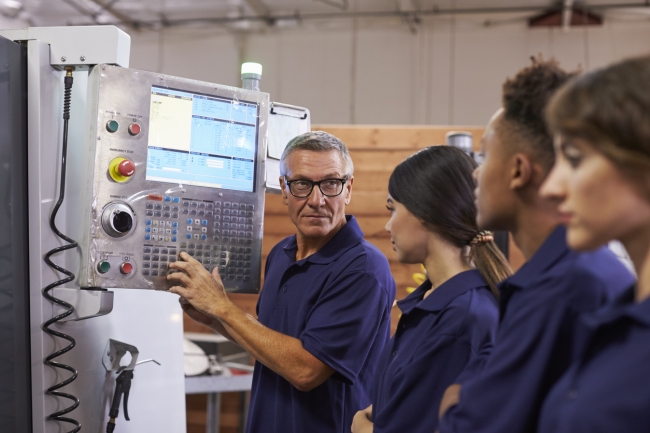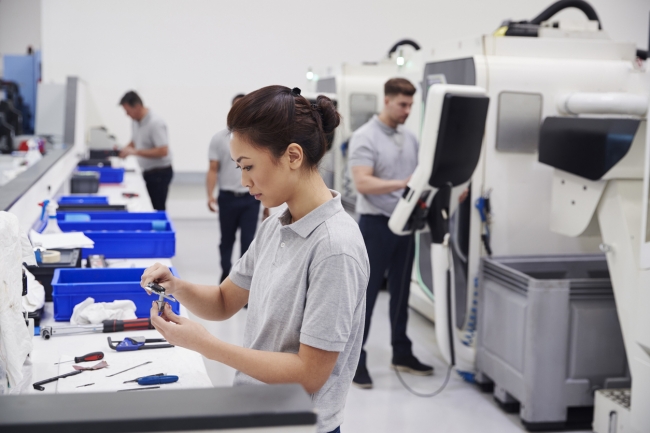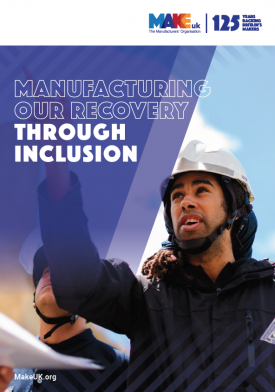4 minute read with link to full report
Manufacturers step up commitment to a more balanced and diverse workforce
Britain’s manufacturers are stepping up their commitment to a more balanced and diverse workforce as they look to make greater use of the talent pool to improve their performance, according to a new survey published by Make UK, the manufacturers’ organisation.
However, the survey makes clear that there is a long way to go to achieve this goal with major challenges facing the sector in terms of age, ethnicity and gender balance which are longstanding. In response, Make UK has published a series of guiding principles that companies should aspire to, as well as recommendations to government to inspire greater progress.
According to Make UK, as manufacturing recovers from the pandemic and embraces new technologies, the task of reframing manufacturing as an attractive, progressive sector with employers who exude this approach has never been more urgent. This transformation will need more highly-skilled employees from all sections of society that can respond to these opportunities and challenges.

According to a survey by Make UK, British manufacturers are stepping up their commitment to a more balanced and diverse workforce / Picture: Getty/iStock
Stephen Phipson, chief executive of Make UK, said: “Manufacturing is undergoing rapid change with the adoption of new technologies and working practices. If businesses are to truly capitalise on these opportunities they must put people at the very top of their agenda and create a truly diverse and inclusive workplace that is representative of society as a whole.
“There is no doubt that industry has, to date, not embraced the societal changes that have taken place with a workforce that isn’t as diverse and balanced as it should be. This means that companies are not making use of the wider talent pool available, despite clear evidence that organisations with a greater balance are better performers.”
According to the survey, over a third of companies (36%) already have an EDI (equality, diversity and inclusion) strategy and a further third (31%) are developing one. However, this still leaves a third of companies not having a strategy or planning to introduce one. On a more positive note, 45% of companies are reviewing their EDI strategy at least once a year suggesting that for manufacturers who have embraced this it is a commitment is not a tick-box exercise.
The survey also shows there is considerable ground to make up in terms of gender and ethnic balance. Under a third of the manufacturing workforce (29%) is made up of women, while 18% of the workforce is from ethnic minority groups.
There is a similar pattern reflected in occupational segregation, with administrative and clerical roles the top position for women (39%) and also the leading role for ethnic minority employees. Women occupy the lowest number of professional engineering positions (8%), while ethnic minority groups make up on average just 5% of board roles.

Make UK has published a series of guiding principles to address the major challenges facing the sector in terms of age, ethnicity and gender balance / Picture: Getty/iStock
Furthermore, just 18% of women occupy board level positions in manufacturing which compares to a third for FTSE 100 companies. The picture is also reflected at apprentice level with 8% being female and 4% from ethnic minorities.
The survey also reinforces the need to appeal to a younger workforce while maintaining the skills and experience of older workers. Over a third of manufacturers (34%) say the average age of their workforce is between 36 and 40 years old, whilst a further quarter (24%) say it’s between 45 and 50 years old.
Equality, diversity and inclusion guiding principles for manufacturers
In response to the survey, Make UK is urging manufacturers to commit to a more diverse and inclusive manufacturing workforce, setting out guiding principles which manufacturers should all commit to. These are:
1. Committing to defining an EDI ambition, publishing this through an EDI statement owned and championed by senior leaders in the business.
2. Committing to creating a truly inclusive culture by building a workforce reflective of the working population, and the local community.
3. Committing to sharing best practice with peers and learning from those who have made positive change.
4. Committing to adapting and reviewing EDI work by embedding a culture of learning throughout the business.
In addition, Make UK believes there are measures government can take to encourage greater progress in EDI, these include:
1. Publishing accessible workforce data by locality to enable employers to assess their workforce diversity against their local area.
2. Providing further guidance on data collection so that it does not act as a barrier for business to collect, monitor and track diversity data and progress.
3. Continuing to promote greater pay transparency among larger businesses and providing best practice for small businesses to participate.
4. Committing to work with industry on policies around flexible working, returning to work and childcare to understand how these policies can encourage greater diversity in sectors such as manufacturing.
